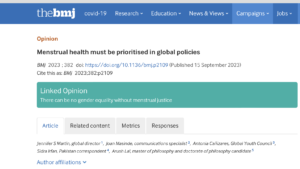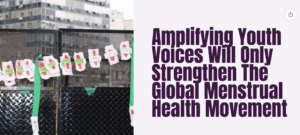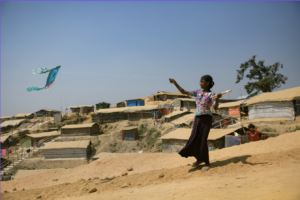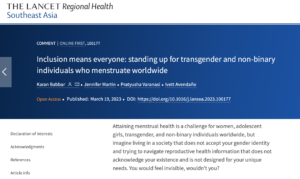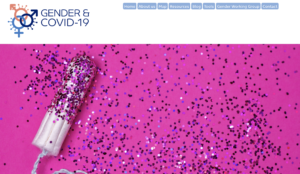The relationship between gender-based violence (GBV) and menstrual health is more entwined than people may think. Both GBV and menstrual discrimination are human rights violations and public health issues because they prevent women, girls, and queer individuals from fully participating in society. In addition, they cause humiliation, deprive individuals of personal liberty, and take away their agency. Furthermore, GBV and menstrual discrimination are deeply rooted in structural intersectionality of patriarchal notions, toxic masculinity, ableism, and classism.
Menstrual discrimination is both a product and driver of GBV, adversely impacting people who menstruate in sectors of health, hygiene, social value, and the ability to live a safe life free of stigma or shame. The complex intersectional impact of misogyny, patriarchy, classism, ableism and other social discriminatory lens have marked menstruation as taboo, and people who menstruate are subjects of “indignities” and control, rendering them vulnerable to GBV relating to menstrual health.
GBV perpetuated through menstrual discrimination can manifest in several forms. For example, individuals experiencing GBV may experience financial abuse, including restrictions on personal expenditures and the inability to control personal or household finances. The power dynamic associated with financial abuse is due to the overarching patriarchal society, which historically did not allow people who menstruate to control finances, leaving people who menstruate vulnerable to financial control. A person may be unable to purchase necessary menstrual products because their expenses are owned by someone else, usually people who do not menstruate. If unable to buy products, people are often forced to substitute with inadequate products: The WoMena study (2018) highlights that individuals were forced to make menstrual pads out of household items due to limited power within their relationship and no financial control or money.
Others may be forced to manage menstrual health needs in other ways: Individuals may be forced or coerced by a partner to have sex in exchange for period products. Others may be forced to survive sex with non-partners to obtain basic goods, such as period products. In 2019, there were several reports from Kenya of many people who menstruate exchanging sex for menstrual products. There have also been reports of officers and others working in correctional facilities raping or assaulting those incarcerated in exchange for pads and tampons within the United States. Having another person be in control of the products needed for hygiene and innate needs can lead to mental health issues, such as feelings of dehumanization, humiliation, and shame.
GBV, through the form of sexual and emotional abuse, may also build upon menstrual discrimination: Sex may be used as a means to make an individual feel ashamed of their period or to make them feel disgusted by their own body while bleeding. Sex can be withheld, and emotional abuse may be employed to critique the cleanliness of menstrual blood and the person bleeding. This builds upon the stigma associated with menstruation and the myth that menstrual blood is “dirty.”
The discrimination and humiliation of individuals who menstruate extend beyond the home: menstrual discrimination may arise from other systems, such as work environments and school systems. Such methods may restrict behaviour and schedules, such as when someone can use the restroom or the ability for someone to take menstrual leave. The strict control of programs and processes to obtain period products makes it difficult for individuals to address their self-defined needs promptly. Individuals could be forced to ask permission to manage their innate needs.
Menstruation discrimination is also perpetuated through social environments and the media. This is commonly done through marketing campaigns. For example, the innovation of discrete packaging, “quiet wrappers”, use of blue blood in ads, and the employment of menstrual euphemisms to further enforce silence and concealment of menses from the public eye. Menstruating people are trained to hide menstrual products and never speak about their menses, menstrual pain, or health concerns. People who menstruate learn to internalise the stigma and project the inferior, less-than, dirty, ashamed, embarrassed, impure and stigmatized beliefs around menses to themselves, the menstruator.
This norm of silence is dictated by the patriarchal society, which represses menstruation, and silos menstrual discrimination solely to people who menstruate. The silencing of menstruation compounds the silence of GBV within a patriarchal society. This ultimately builds a cascade of barriers that may make it difficult to seek support or resources for menstrual health and GBV. It causes work environments, school systems, medical systems, and more to overlook menstrual health needs and perpetuates menstrual discrimination.
The Way Forward
Efforts addressing the intersection of menstrual discrimination and gender-based violence should occur across four main domains: 1) access to contextually and culturally appropriate education, 2) a variety of safe, affordable, and appropriate products, safe and private spaces to change products, 3) gender-transformative policies that address menstrual stigma and shame, and 4) gender-responsive policies that support access to those above physical and structural components that underpin poor menstrual health.
At the governmental level, menstrual health and justice policies should be ensured in law at both the local and national levels. First, to address the financial burden, policies can be implemented to remove extra taxeson menstrual products and to subsidise products. Correctional facilities, workspaces, educational spaces, and state- and government-funded institutions should have a variety of free, safe and suitable products available for menstruating people. Water, sanitation, and hygiene (WASH|) facilities should be safe and accessible in public spaces and include a proper disposal system. Nonfunctional WASH facilities, like non-functioning water supply, handwashing sinks, toilets, and appropriate waste disposal systems, should be renovated to include the proper infrastructure.
Menstrual leave policies should be enacted to ensure individuals can prioritise their menstrual needs without employment or financial repercussions. The government should also implement policies recognising individuals’ full menstrual and reproductive autonomy, including abortion access. In schools, the government should enact educational policies that mandate medically accurate menstrual and reproductive health education for all students, menstruating or not. Moreover, governments should prioritise supporting research and initiatives that focus on menstrual and reproductive health: the reprioritisation challenges the stigma (and subsequent myths about menstruation) and the parallel notion that menstruation should be a private matter.
Menstrual product companies and advertising companies should adopt positive menstrual language and images when advertising or co-designing menstrual products, taking notice to mitigate the rhetoric of silence around menses. This can be done through branding, avoiding names like “whisper” and “secret”.
Changes to cultural norms and values can take generations to adopt. Co-designed campaigns with communities can support the co-creation of culturally and contextually specific information and generate collective buy-in. Working with communities to facilitate their understanding of menstruation can offer an iterative and holistic mechanism for addressing menstrual stigma and shame. Communities can introduce diverse choices of menstrual products, train individuals how to use products, share advice for menstrual issues, and foster a sense of community for the new menstruators.
All organisations should assess the role they might play in furthering menstruation discrimination and stigma in operations, language, priorities, and organisational values. As leaders in the global health and gender equality space, it is crucial that they set an example and prioritise menstrual health.
Menstrual movements have long prioritised access to WASHand menstrual products. Although these areas are crucial for attaining menstrual health, menstrual activities should also consider the multidimensional consequences of menstrual discrimination. Continuing to prioritise these areas without addressing menstrual stigma and shame will reinforce the ideas of impurity, dirtiness, and stigma around menstruation. Such stigma impacts psychological state, social well-being, self-esteem, and self-empowerment. The psychological impact of low self-esteem, lack of bodily knowledge or empowerment, lack of agency, and lack of bodily autonomy leads to higher rates of sexual and reproductive health conditions, barriers to care, and opportunities for GBV like sexual assault, child marriage, and domestic violence.
As a global movement, we want to elevate the intersectional nature of menstrual health and show how menstrual health discrimination can impact people who menstruate and their communities. We need to centre dignity at the forefront of menstrual advocacy, prioritising eliminating taboos, shame, and restrictions. We also need to unpick the root causes of menstrual discrimination, which can result in psychological/physical GBV and impact an individual’s agency. These can be manifested through harmful taboos, embarrassment and shame, restrictions, abuses, and violence, and are deeply rooted in gender inequality.
Addressing GBV about menstrual health requires cross-collaboration and action-oriented advocacy from a grassroots organisation, as well as global coordination and ownership from national and international actors in the menstrual health space. Recognising the complex intersection of menstrual discrimination and GBV as both the driver and product is the first step in understanding the multidimensional and intersectional outcomes of poor menstrual health. This will require a financial commitment from global health actors and governments so that further research can be commissioned, grassroots movements funded, and advocacy efforts coordinated.
Menstruation, a typical biological experience, and function, should not be a driver for GBV nor amplify opportunities for GBV for people who menstruate. People who menstruate deserve freedom from any violence, stigma, and shame associated with menstruation and a chance to live a dignified life.


